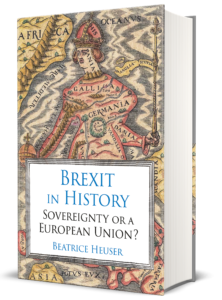In 1992, at the opening conference of the European Movement in Scotland, Jack Mackenzie Stewart, former President of the European Court of Justice, noted that ‘every treaty, every international agreement, involves a sacrifice of sovereignty by the contracting powers’. This is true not only for international agreements and treaties, but also for the social contract on which any society is built.
‘Sovereignty’, like ‘freedom’ or ‘liberty’, has become a sacred rallying cry, which, whenever uttered, invokes an almost automatic response of support for whatever is being proposed. Rather curiously, Britain’s EU referendum result suggests that a similar response cannot be elicited by the exclamation of terms such as ‘solidarity’ and ‘cooperation’.
Several times throughout history, a single ruling prince, oligarchy or nation has been compelled to surrender their sovereignty to a superior power that used physical force against them. With this in mind, it is unsurprising that manifestations of this in the modern world would be resented profoundly, and that substantial efforts would be made in order to reverse them. However, when the limitation of sovereignty is a voluntary choice made in return for clear benefits, judging this to be a great loss rather than a gain is highly irrational. In other words, elevating sovereignty onto a pedestal and worshipping it like a sacred cow, even though its complete preservation does not serve the greater good, is simply provincial.
Sovereignty is often confused with freedom and liberty. While to some extent sovereignty intimates the freedom of a prince or government to rule as they wish, it certainly does not guarantee the liberties of the people. For centuries, monarchs have defended their sovereign rights fiercely when challenged by the opposition of their subjects. Such power struggles have typically always concerned the upper echelons of society, with liberties being won by the English barons at Runnymede in 1215 and the Scottish nobles at Arbroath in 1320, to give two notable examples. Campaigners for genuine social equality or freedom – from Wat Tyler to Leveller John Rainsborough to Rosa Luxemburg and Karl Liebknecht – tended to be executed or murdered at the command of the ruling authority whom they opposed. Alternative interpretations of ‘freedom’ and ‘liberty’ did not implicate an aim to bring about social equality, but rather, municipal autonomy – the right of communities to do certain things their way, such as levy local taxes, elect their own mayors, decide when to hold fairs and have the right to enforce justice locally. These freedoms would have enabled them to exercise their powers in ways that are now considered illiberal, such as burning ‘witches’ and turning out paupers. Struggles to defend local ‘freedoms’ and ‘liberties’ tended to be directed by localities against emerging centralised states that were seeking to assert their sovereign control domestically.
Evidently, liberty is not without its problems, as John Stuart Mill recognised: ‘my unlimited exercise of my freedom will harm you and vice versa’. The mutual decision to limit freedom, arrived at through negotiation, is thus a rudimentary feature of any community or society whether or not it involves the creation of a Hobbesian state to ensure that the social pact is maintained: ‘I shall surrender my freedom to kill/rob/cheat/slander etc. and you will surrender your freedom to kill/rob/cheat/slander … me’. Similarly, the painstaking construction of rules and behavioural norms between individual states involves voluntarily placing restrictions on the rights of one’s own state, such as the right to pursue its narrow interests by going to war with another state, leaving debts unhonoured, disregarding trade agreements, and so on. Many times throughout history, the obstinate defence of such freedoms has been met with serious backlash – ‘if I can attack you with impunity, the same is true for you; only might is right’. The limitations placed on freedoms, and conformity to rules, is mutually beneficial, offering security, reliability, dependability, and, hopefully, justice, for all.
The freedom to make one’s own decisions without consulting others seems to be worth protecting in theory, but in practice, this frequently yields more difficulties than benefits. Endless debates may be frustrating, but far-reaching decisions with great consequences should only be made after jointly considering their side effects.
Ergo, across eight centuries, diplomats and political philosophers have suggested ways in which European sovereigns could surrender a portion of their sovereignty in favour of joining other governing authorities in some form of confederation, or even federation, to address and settle major issues together, rather than going to war with each other. For centuries they were either ignored or derided by those who defended their monarch’s or polity’s sovereignty as the highest good – irrespective of how much real liberty, equality, or democratic rights they had. Only in the twentieth century were the ideas of those diplomats and political philosophers put into practice, which culminated in the establishment of the European Union – which faces the inevitable opposition of sovereigntists, as recently shown by Brexit. The pattern that the Brexit debate follows is thus an old one, as are the arguments on both sides. Ultimately, the partial surrender of sovereignty is the very foundation upon which civilisation is built, and our liberties are curtailed in order to protect everyone’s basic rights and needs.
Brexit in History
Sovereignty or a European Union? Beatrice Heuser
Hardback | March 2019 | £20 | 9781787381261 | 208pp
